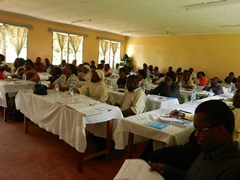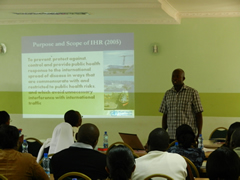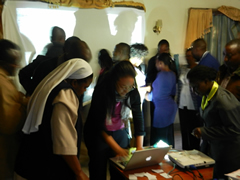- Home
- Technical Cooperation Projects
- Index of Countries
- Africa
- Kenya
- The Project for Development of Rapid Diagnostics and the Establishment of an Alert System for Outbreaks of Yellow Fever and Rift Valley Fever in Kenya
- Project News
- mSOS (mobile SMS-based disease outbreak alert system) Pilot Implementation Training
Project News
2013-10-31
mSOS (mobile SMS-based disease outbreak alert system) Pilot Implementation Training
One of the two pillars of the project, establishment of an early detection and early response vigilance system, aims to develop social technologies though its activities. In JFY2012, disease outbreak alert system via SMS (Short Message Service), namely mSOS: mobile SMS-based disease outbreak alert system, was developed through collaborations with the Ministry of Health and Strathmore University in Kenya. This is a bi-directional alert system which enables health facility in-charges to send notifications of suspected cases (priority diseases with potentials of disease outbreaks) in real-time to Ministry of Health, and it also enables Disease Surveillance Coordinators (national and county/district officers) to respond rapidly.
Training of mSOS implementation was conducted 3 training sites in 2 regions in Kenya (Busia County in Western Region and Kajiado County near the capital Nairobi). The training in Busia was conducted 16-17 September and in Kajiado 1-2 October and 3-4 October 2013. Training participants were Medical Officers (DMOH: District Medical Officer of Health) and Disease Surveillance Coordinators (DDSC: District Disease Surveillance Coordinator) from district, county, and national levels. Training participants also included health facility in-charges from each of the selected health facilities. (A total of) over 200 health care workers attended the training.
The training included two sessions. On the first day, national guidelines of surveillance, the IDSR (Integrated Disease Surveillance and Response) policy was reviewed. On the second day, practical training sessions on mSOS using distributed mobile phones were conducted. There were some participants who were hesitant to try the new system at first, however, once they tried to operate the mobile phones with instructions on the mSOS manual, they found it useful, saying that "the input is very simple and easy to follow" and they were happy that "the information is not only sent one-way, but responses are also sent back." The Ministry of Health and county/district DMOH and DDSC also stated "this system will facilitate rapid response since notifications are sent real-time."
Cluster randomized control trial is applied to evaluate objectively the impact of the mSOS implantation. After 6 months of pilot implementation, endline survey will be conducted to compare the results of intervention groups (case) and control groups (control). It is planned to analyze scientifically the usability and feasibility of the system (qualitative analysis) and timeliness of disease notification and response (quantitative analysis).



- About JICA
- News & Features
- Countries & Regions
- Our Work
- Thematic Issues
- Types of Assistance
- Partnerships with Other Development Partners
- Climate Change / Environmental and Social Considerations
- Evaluations
- Compliance and Anti-corruption
- Science and Technology Cooperation on Global Issues
- Research
- JICA Development Studies Program / JICA Chair
- Support for the Acceptance of Foreign HRs / Multicultural and Inclusive Community
- Publications
- Investor Relations
